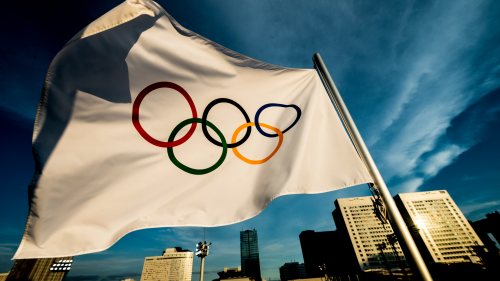Publics React to Mandatory Vaccination, the Olympics, and Governments' COVID Management

Populations around the world remain divided over how comfortable they are returning to normal life as the Delta variant spreads.
This week the world passed the 191 million case mark, with over 4.1 million deaths attributed to COVID-19. In many countries, vaccine rollouts are picking up steam, and optimism about a return to normal is increasing. However, where vaccinations have lagged, the pandemic continues to take a toll. For this week’s COVID-19 update, the Chicago Council Survey team looks at polling results from the United States, Japan, South Korea, France, and the United Kingdom.
Key Findings
- A Kaiser Family Foundation finds that the majority of Americans (62%) do not want their employers to require employees to be vaccinated. These results, however, differ dramatically by party with a majority (62%) of Democrats saying that they want their employer to require vaccination while a majority (85%) of Republicans are opposed.
- Approval rates for Prime Minister Suga and his cabinet are at a record low: 46 percent disapprove, and only 33 percent approve, of the Suga cabinet. Yomiuri finds two-thirds of Japanese (66%) disapprove of the government’s anti-COVID efforts, and a majority (56%) say that the latest state of emergency enacted in Tokyo will not be effective in preventing the spread of COVID-19.
- As cases in South Korea spike, approval of the government’s handling of the pandemic have fallen to 47 percent from 64 percent in June.
- With the Olympic and Paralympic Games opening in Tokyo on July 23, a majority of Japanese want to see a Games without fans in attendance (40%) or with a few fans in the stands (17%)—though a sizeable minority of the public (41%) would prefer to see the games suspended.
- Even with the easing of restrictions in the UK, less than half (49%) say that they would feel confident attending sport events and concerts, even after being vaccinated.
United States
33,741,532 cases, 603,880 deaths
After weeks of decline, the seven-day average death toll in the US increased by 26 percent this week, representing a grim turning point in what CDC Director Dr. Rochelle Walensky has begun to call “a pandemic of the unvaccinated.” While Dr. Walensky’s statement may come as a comfort to the 161.5 million Americans who are fully vaccinated, a “pandemic of the unvaccinated” still means a pandemic of 52 percent of the American population. Additionally, cases of COVID-19 in fully vaccinated, prominent individuals like Florida Congressman Vern Buchannan and US Olympic team members Kara Eaker and Katie Lou Samuelson have even vaccinated Americans questioning how protected they are against the Delta variant.
Despite the “breakthrough” cases among vaccinated Americans, the biggest hurdles in the country remain tackling vaccine hesitancy and addressing questions of mandatory vaccination by private entities. According to aset of surveys from the Kaiser Family Foundation, most Americans have followed through on their original intentions when it came to getting vaccinated. Nine in ten (92%) of those who said in January that they planned to get the vaccine as soon as possible have done so. Half (54%) of those who planned to wait and see have also now gotten the shot, as did a quarter (24%) of those who initially said they would not get the vaccine or only would if required to do so.
The segment of the population that remains unvaccinated is far from uniform. Those that remained unvaccinated at the time of the second round of the KFF survey (June 8-21)—adults who say they still plan to “wait and see” about the vaccine—are more likely to be young and people of color. Those who say they will definitely not get the vaccine tend to be Republican-leaning and residing in rural areas. The June 11-22 round of the Consumer Reports American Experiences Survey (AES) finds that, when deciding whether to get the vaccine, unvaccinated people are mainly worried that either the COVID-19 vaccine in particular (46%), or vaccines in general (13%), are unsafe. What unvaccinated people are largely not doing, it seems, is waiting for the right incentive campaign. The June AES finds that only 5 percent of adults have altered or considered altering their vaccination plans in due to incentives such as college tuition lotteries, cash lotteries, or free food and beer.
While many Americans remain hesitant when it comes to taking the vaccine themselves, this is not always the case when it comes to mandating the vaccine for others. Overall, the KFF finds that the majority of Americans (62%) do not want their employers to require employees to be vaccinated. These results, however, differ dramatically by party with a majority (62%) of Democrats saying that they want their employer to require vaccination while a majority (85%) of Republicans are opposed. When it comes to mandating vaccines for certain key groups, Americans seem to be much more united. A June 22-27 POLITICO-Harvard T.H. Chan School of Public Health poll finds that majorities of Democrats and Republicans support mandatory vaccination for both public school teachers and healthcare workers. With the hyper-transmissable Delta variant now accounting for 83 percent of genetically sequenced COVID-19 cases in the US, the stakes will only get higher in the next few weeks for US schools and employers still deciding whether or not to mandate vaccination.
Japan
847,614 cases, 15,079 deaths
The 2020 Olympic and Paralympic Games open July 23 in Tokyo. It’s been five years since then-PM Abe Shinzo rose from the stage in Rio (wearing a Mario hat) to accept the mantle of Olympic host. Delayed a year due to the global pandemic, the Games have been dogged by scandals, COVID-positive athletes, and ad pullouts by top sponsors. But the Games will go on.
Will there be fans? That may depend on where in the country the event is. Competitions held in Tokyo will not have spectators under current rules, nor will events in nearby Saitama, Chiba, or Kanagawa prefectures. But as many have pointed out, other sporting events in Japan have had fans in attendance. Nearly four thousand were allowed indoors to watch the thrilling conclusion of the Nagoya sumo tournament, and nearly ten thousand fans turned out last week to watch their Seibu Saitama Lions take down the Chiba Lotte Marines. Officials have left open the possibility of changes down the line, but at least for now, the Olympic venues will be empty. But the Games will go on.
What about the public? According to Yomiuri polling conducted July 9-11, a majority of Japanese want to see a Games without fans in attendance (40%) or with a few fans in the stands (17%)—though a sizeable minority of the public (41%) would prefer to see the games suspended. An NHK survey fielded July 9-11 reveals that support for postponing the Games a second time is strongest among opposition-party supporters, while supporters of the ruling LDP back the government’s plan to go ahead with limited fans (though three in ten LDP supporters would like to see some fans allowed in).
None of this is doing PM Suga any favors politically. Disapproval rates for Suga and his cabinet are on the rise again, with NHK polls finding Suga at a record low: 46 percent disapprove, and only 33 percent approve, of the Suga cabinet. Yomiuri finds two-thirds of Japanese (66%) disapprove of the government’s anti-COVID efforts, and a majority (56%) say that the latest state of emergency enacted in Tokyo will not be effective in preventing the spread of COVID-19. NHK polling also finds that most Japanese are not convinced by either the border control measures for incoming athletes (57%) or by the organizers’ assurances of anti-coronavirus measures (65%). But the Games will go on. And according to Yomiuri polling, three-quarters of the public (74%) say they plan to watch some of the competitions.
Best of luck to the athletes - 頑張って!
South Korea
182,265 cases, 2,060 deaths
South Korea is experiencing a fourth wave of infections. On July 21, it confirmed 1,784 cases—the highest count since the pandemic began.
Accordingly, public sentiment has turned negative. According to Gallup Korea's July 13-15 survey, 71 percent are worried about infections, and the share of those who think the government is doing a good job in handling the pandemic has dropped from 64 percent in June to 47 this month. Among all age cohorts, people in their 20s—a group that has yet to be vaccinated—has the highest disapproval of the government's COVID-19 response (58%).
Last Monday, the government reinstated the highest level of social distancing in the capital area. Private gatherings of more than two people are banned after 6pm and all schools will switch to online classes. These restrictions will be in place for two weeks. According to Realmeter's July 9 survey, majorities (72%) think that strengthening protocols is a good idea. However, responses differ across ideological lines—more liberals (92%) agree than moderates (66%) and conservatives (53%). Get togethers of more than five people are banned in the rest of the country as well from July 18 to August 1.
Soon after the new social distancing measures were announced, more than 400 small business owners held a rally last Thursday to express grievances over their economic hardship. In fact, the 14 percent increase in “corporate loans at the end of the first quarter this year compared to the same period in 2020 was driven by small and medium enterprises.” According to the Korea Economic Research Institute's survey released last Monday, nearly 8 in 10 (79%) small businesses saw their sales decrease—22 percent on average—in the first half of this year. Nearly half (45%) reduced the number of employees.
From July 4 to 10, the Delta variant accounted for 31 percent of all new cases and authorities say that it might become the most dominant strain by August. Additionally, they are expecting the number of daily cases to reach the 2000s next month. Meanwhile, as of July 17, only 13 percent of the population is fully vaccinated.
France
110, 513 deaths, 5,753, 579 cases
In the past year, France has undergone three country-wide lockdowns in an attempt to contain the COVID-19 pandemic. On June 20, the country emerged from its latest closure, lifting the curfew and allowing restaurants, cafes, hotels, and cinemas to re-open. These new measures were well-received: 77 percent of the French population approved of Prime Minister Jean Castex’s decision to ease restrictions. Following the lockdown, France reported high vaccination rates. Presently, 37,523,594 (57%) French citizens have received at least one dose of the vaccine, and 30,351,644 (46%) citizens are fully vaccinated.
While these vaccination rates remain promising, the COVID-19 Delta variant presents a new set of challenges. The Delta variant is more contagious than other strains of the coronavirus, and presents the biggest threat to unvaccinated individuals. In an attempt to slow the spread of the deadly variant, French President Emmanuel Macron revealed plans to mandate coronavirus vaccinations for health-care workers. He announced all workers must be vaccinated by September 15, explaining that failure to meet this requirement could result in potential sanctions, fines, the suspension of pay, or inability to work altogether. The president also introduced plans for a “health passport”: a QR code proving an individual has a negative COVID-19 test, is fully vaccinated, or recently recovered from COVID-19. The digital passport will take effect in August, and will be required in bars, restaurants, cafés, and shopping centers.
The president’s address has had widespread positive and negative implications. Four in ten (42%) of the population stands opposed to mandatory vaccinations for everyone, while 28 percent of the population is opposed to mandatory vaccinations for healthcare workers. Over the weekend more than 100,000 people protested Macron’s announcements, questioning the safety of the vaccine and claiming the new measures were a violation of freedoms.
Although the announcements may not have been well-received everywhere, they did prove effective. Immediately following Macron’s address, France’s online health portal, Doctolib, crashed as 926,000 citizens booked appointments to receive their first shot. Doctolib called the crash an “absolute record.” Although this eagerness is encouraging, a significant minority (19%) of France’s citizens say they will probably or certainly not get vaccinated. The country’s vaccination rate has slowed as well. At the end of May, France reported more than 400,000 daily injections, but this number has since dwindled to only 165,000 injections per day.
United Kingdom
5.4 million cases, 128,683 deaths
The UK government recently lifted most COVID-19-related restrictions. As a result, laws requiring masks to be worn indoors and capacity limits for bars and restaurants have ended on a nation-wide scale. This decision has brought backlash from other politicians, including the leader of the opposition Labour party, Keir Starmer, who called PM Boris Johnson's decision "reckless." Further tainting his image, PM Johnson was forced to quarantine after meeting with health minister Sajid Javid, who tested positive for COVID-19 hours after their encounter.
With restrictions eased, events and festivities around UK ‘Freedom Day’ soared, and Londoners were legally allowed to party for the first time in over than a year. This has led to a surge in cases: since July 12 39,950 new cases per day have been recorded, a total of 322,170 new cases in the last week. Despite the sudden rise in positive cases, the country remains on track for its vaccination roll-out plan. On July 19, Nadhim Zahaw I, who has served as Parliamentary Under-Secretary of State for COVID-19 Vaccine Deployment since 2020, announced that the country-wide goal of administering two vaccine doses to two-thirds of the British adult population was reached five days early. Yet the fact remains that Britain is still in the top 10 countries worldwide for the most casualties, with 128,700 deaths since January 2020.
While the government is taking a liberal approach to legally sanctioned restrictions, a July 14 Ipsos Mori poll finds that the British population is still wary of returning to pre-COVID activities. More than eight in ten (82%) say that they will continue to wear a mask in public. While the population begins to feel more comfortable with returning to normality, less than half (49%) say that they would feel confident attending sport events and concerts, even after receiving their COVID-19 vaccine. When it comes to visiting other countries, Britons are even more cautious. Less than half (46%) wish to fly to countries where the vaccine is available, and this number drops to less than a third (29%) for countries where the vaccine is not yet available.
The easing of restrictions is not the only cause for worry in the UK. While almost seven in ten Britons (68%) agree that school closures were acceptable, many are concerned about the longer-term ramifications for the mental wellbeing of their youth. A new global poll by Ipsos Mori confirms that 45 percent of people living in the UK believe one of the longest lasting outcomes for children will be worse mental health. Additionally, a third (34%) believe it will lead to underdeveloped social skills or issues with self-esteem.







